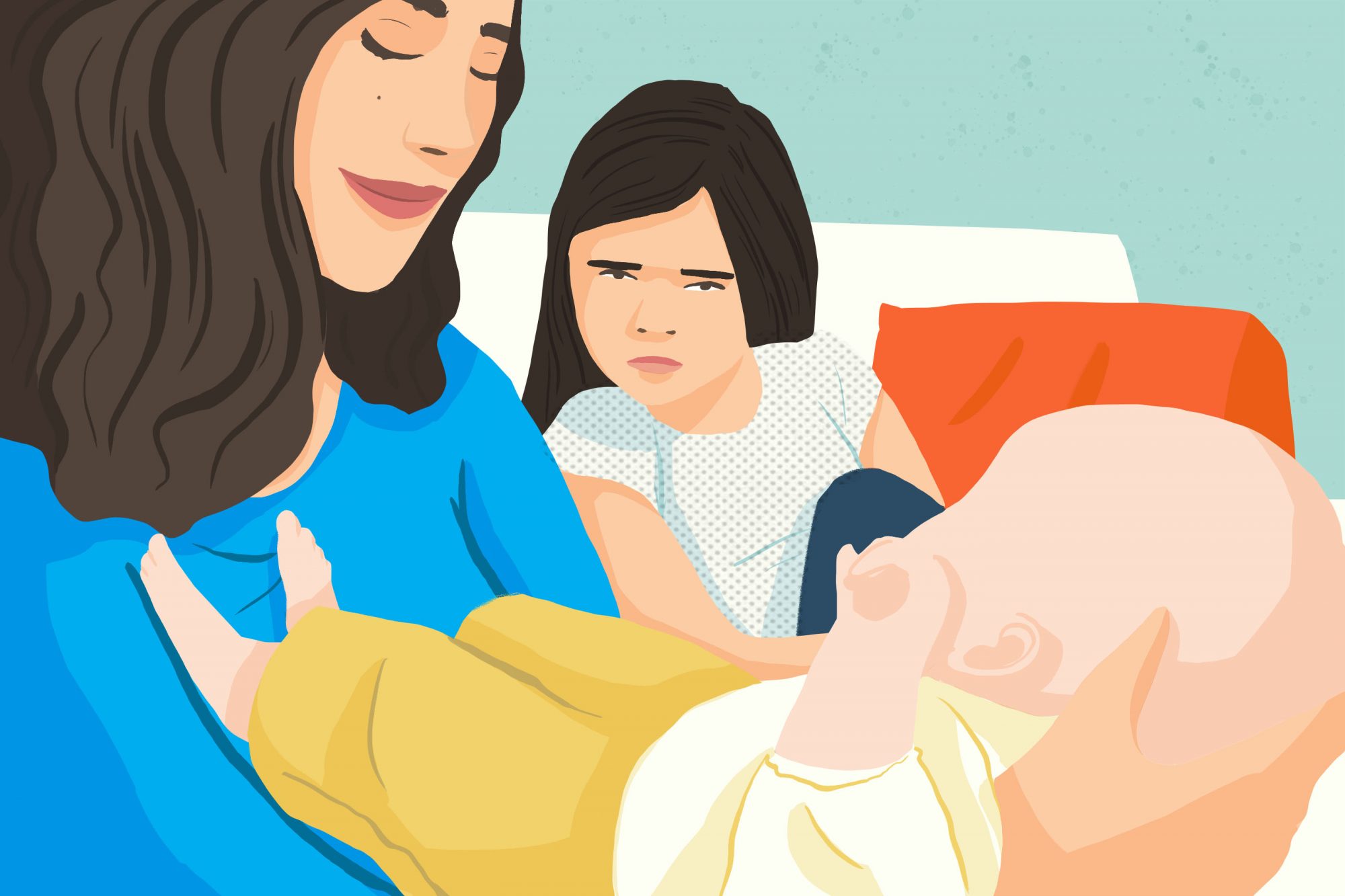
I have a 5-year-old and a 1-year-old, and my older child wants nothing to do with the baby. Not only that, she is sometimes mean—pushing her over, throwing toys at her, and acting angry when we give any attention to the baby. The baby is her older sister’s best audience and biggest fan. How do I help my older child care about her younger sibling?
Growing up as an only child myself, my children's sibling relationships often leave me dazed and confused. Many parents struggle with the difference between the idealized vision of siblings as lifelong friends, and what happens under their roofs day in and day out. Your children's young ages mean there is plenty of time for them to figure out their relationship, but I know you want them to have the best start possible. (Like some acts of care and kindness from big sister to little sister!)
The Attention Connection
What jumps out from your question is the negative behaviors happening "when we give attention to the baby." Obviously, babies need more attention than 5-year-olds, and it sounds like your older daughter is protesting this reality with big actions! Another outcome of these problem behaviors, however, is I'm pretty sure they do get your attention. As we know all too well with children, negative attention is better than no attention.
I recommend that first, you increase positive attention for your 5-year-old. Since you are a busy parent of two children, including a high-needs almost-toddler, I know finding more time (and energy) in your routine may be a struggle! Focusing on goals can help motivate you, so it will help to start there. For example, you identified your goal that you want your older child to care about her sibling. I imagine other goals may include wanting your oldest to be confident of how loved she is, even with less attention, and for their sister relationship to be close and connected.
Focusing on these larger goals can help you muster your limited time and energy for ramping up positive attention for big sister. This age group usually covets one-on-one time with parents, so finding time both in the busy day (even 20 minutes during baby's naptime) and week (planning a special outing to a café for a treat) helps your daughter feel closer and more connected to you. You and your partner can take turns, and even get your daughter's input on when and where to have this special time so she feels that much more valued. Shoring up your separate relationships with her may be enough to fade the problem behaviors with her baby sister.
The Classic Culprit: Jealousy
Knowing negative behaviors in young children signal underlying emotions they likely do not know how to handle, however, you may need to do some deeper work. The most obvious culprit here is classic jealousy, which is an important emotion we all need to manage in life no matter how old we are. Helping her have a name for what she's feeling, empathizing that feeling this way is normal and understandable, and giving her other ways to express it (like saying it rather than throwing objects) can go a long way for her own skill development around coping with difficult emotions. Her experience of being seen and understood, even for what might be viewed as a "bad feeling," could help diffuse its intensity. Turning down the volume on big emotion usually translates to behaviors settling down as well.
Big Sister Empowerment
Once you have tended to your relationship through more attention and connection, and addressed your daughter's experience with big, hard feelings, she will likely be ready for shifting to the positives of being a big sister. Think of how you and your partner can build up her confidence and self-esteem focused on her role as big sister. Point out the positive behaviors and give specific praise: "Wow! Your sister was crying and then you made that funny face, and she laughed! You just helped her feel better. She's so lucky to have you as her big sister."
You can also identify ways she wants to be more involved with her baby sister. Observe caregiving or helper tasks she appears to enjoy, and magnify those as an important responsibility (this age group loves to feel industrious!). Think about her strengths, and consider how you can translate these strengths into helpful tasks to keep increasing her sense of pride as the big sister. For example, my son at that age loved wiping counters. Unfortunately, he has never been gifted the baby brother he desperately wants, but if he did, he could be in charge of wiping the baby's mess off the counters. There is literally no task too small!
You also mention that the baby is her "best fan and biggest audience," and indeed, younger siblings can be very forgiving. Again, once the attention and jealousy factors have been addressed, she is more likely to be receptive to pointing out how much her baby sister truly adores her.
The Bottom Line
Sibling relationships can be a moving target, often shifting from bonding to bickering in matters of seconds. As parents, we cannot control or predict if our children are cut out to truly be friends, but we can provide the environment to optimize loving, close relationships. This includes building each separate parent-child relationship with attention and connection, as well as ushering our children through the storms of strong emotions with the assurance that we love them, difficult feelings and all. Finally, if we can show our children that we see their unique strengths and valuable role in the family, their confidence and emotional security helps them be the best sibling they can be. At least some of the time.
Submit your parenting questions here, and they may be answered in future 'Ask Your Mom' columns.
Emily Edlynn, Ph.D., is the author of The Art and Science of Mom parenting blog and a mother of three from Oak Park, Illinois. She is a clinical psychologist in private practice who specializes in working with children and adolescents.
Read More Ask Your Mom columns here.





